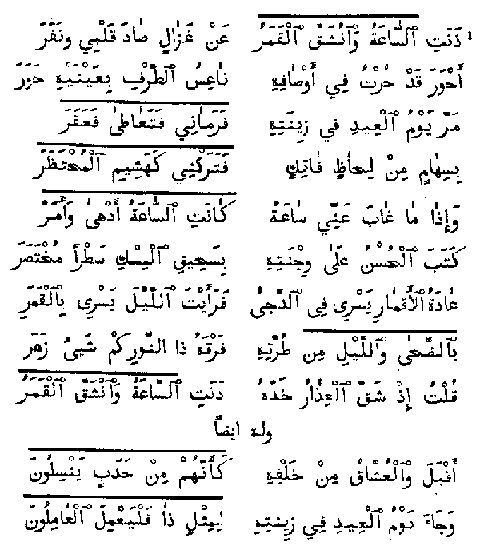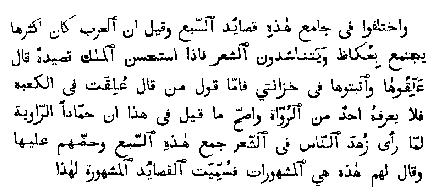Did Muhammad Plagiarize Imrau'l Qais?
Some might have heard the above questioned claim, repeated by some
Christian authors who do not know better (and then also by those
who read their books). The following article will show that this
claim is not substantiated by sufficient evidence.
This result of my investigation into the origin of this claim is
provided as an apology to the Muslims who might have had to bear
this attack through an unsubstantiated allegation and as a service
to the Christians so that they may know better and not base any
argument on information erroneously claimed to be a fact. We are
called to be people of truth and need no false claims, either for
our own faith or in questioning Islam.
On page 9 of Rev. W. St Clair-Tisdall's book The Sources of Islam,
being Sir William Muir's translation of Tisdall's Persian work
Yanabi`u'l Islam, and published in 1900, we find the following
paragraphs on pages 9-10:
It is interesting also to note that some verses of the Coran
have without doubt been taken from poems anterior to Mahomet's
assumption of the prophetic office, in proof of which two
passages in the Sabaa Moallaqat of Imra'ul Cays etc.
are quoted, in which several verses of the Coran occur, such
as, "The hour has come, and shattered is the moon."[1]
It was the custom of the time for poets and orators to hang up
their compositions upon the Kaaba; and we know the Seven Moallaqat
were so exposed. We are told that Fatima, the Prophet's daughter,
was one day repeating as she went along, the above verse. Just
then she met the daughter of Imra'ul Cays, who cried out:
"O that's what your father has taken from one of my father's
poems, and calls it something that has come down to him out of
heaven"; and the story is commonly told amongst the Arabs until
now.
The connection between the poetry of Imra'ul Cays and the Coran
is so obvious that the Moslem cannot but hold that they existed
with the latter in the Heavenly Table from all eternity! What
then will he answer? That the words were taken from the Coran and
entered in the poem, - an impossibility. Or that their writer was
not really Imra'ul Cays, but some other who, after the appearance
of the Coran, had the audacity to quote them there as they now
appear; - rather a difficult thing to prove!
[Footnote]
1. The two passages given by our Author from the Sabaa Moallagat
contain several verses, more or less similar to the Coran: - Surah liv. 1, xxix. 31 and 46, xxxvii. 59, xxi. 96, xciii. 1, this last, - By the
brightness of the morning; and by the night when it groweth dark.
The passages noted are the same in both, with occasionally a few verbal differences.
The Sources of Islam, an (otherwise) very useful book, has
been reprinted many times and is readily available. This might be
one reason that the above claim is well publicised.
Sadly, St. Clair-Tisdall's second book on this topic, The Original
Sources of the Qur'an, published by SPCK, London, 1905, has
apparently never been reprinted, even though it is far more thorough
(287 pages) and a vast improvement over the first book (102 pages).
But most people don't want to read voluminous books and publishers
like to print books that sell.
This is probably the main reason that it is not well known that the
author has changed his opinion in his later book in regard to the
above quoted conclusion.
On pages 47-49, we find the "Appendix to Chapter II" quoted
here in full:
It is sometimes said in the East at the present day that Muhammad
not only adopted many of the ancient habits and religious rites
of the heathen Arabs and incorporated them into Islam, but that
he was also guilty of plagiarism in borrowing parts of certain
verses of Imrau'l Qais, an ancient Arabic poet. These, it is
asserted, may still be found in the Qur'an. I have even heard
a story to the effect that one day when Fatimah, Muhammad's
daughter, was reciting the verse "The Hour has come near and
the Moon has split asunder" (Surah LIV., Al Qamar, 1), a daughter
of the poet was present and said to her, "That is a verse from
one of my father's poems, and your father has stolen it
and pretended that he received it from God." This tale is probably
false, for Imrau'l Qais died about the year 540 of the Christian
era, while Muhammad was not born till A.D. 570, "the year of the
Elephant."
In a lithographed edition of the Mu`allaqat, which I obtained
in Persia, however, I found at the end of the whole volume certain
Odes there attributed to Imrau'l Qais, though not recognized as his
in any other edition of his poems which I have seen. In these pieces
of doubtful authorship I found the verses quoted below.[1] Though
they contain some obvious blunders, I think it best to give them
without correction. The passages marked with a line above them occur
also in the Qur'an (Surah LIV., Al Qamar, 1, 29, 31, 46; Surah XCIII.,
Adduba', 1; Surah XXI., Al Anbiya 96; Surah XXXVII., As Saffat, 59),
except that in some of the words there is a slight difference
though the meaning is the same. It is clear therefore that there is
some connexion between these lines and the similar verses of
the Qur'an.

[Footnote]
1. Regarding the Mu`allaqat it may be well to quote the following from Abu Ja`far Ahmad ibn Isma`il an nahhas (died A.H. 338) He says:-

As-Suyuti says very much the same, though he also refers to
the story that the verses were hung up in the Ka`bah as possible (Mudhkir, II., 240).
There seems good reason to doubt whether Imrau'l Qais is the author
of the lines in question. They may have been borrowed from the
Qur'an instead of having been inserted therein from an author who
lived before Muhammad's time. On the one hand it is difficult to
suppose that at any time after the establishment of Islam any one
would have the daring to parody the Qur'an by taking passages from
it and applying them to the subject to which these lines of poetry
refer. On the other hand, it is very customary even in comparatively
modern times to quote verses of the Qur'an and work them into later
compositions of a philosophical or religious character, to which
class, however, these Odes do not belong. It would be difficult
to imagine Muhammad venturing to plagiarize from such a well-known
author as Imrau'l Qais (even though, as we shall see later, he did
so from less known foreign sources); though this may be in
part met by supposing that, as these Odes formed no part of the
Mu`allaqat, they were not as generally current as poems
contained in the latter collection were. The account generally
given of the Mu`allaqat is that, whenever any one had composed
an especially eloquent poem, it was suspended on the wall of
the Ka`bah, and that the poems in this celebrated collection owe
their name, which means " The Suspended Poems," to this custom.
Good authorities[1], however, deny that this was the origin of the
name, but that is perhaps a matter of little importance. In spite
of the Eastern story which I have quoted, the balance of probability
certainly inclines to the supposition that Muhammad was not[1] guilty
of the daring plagiarism of which he has been accused.[2]
[Footnotes]
1. This is the opinion of Sir C. J. Lyall, than whom it would be
difficult to find any one better qualified to speak on the subject
of ancient Arabic poetry. In a letter which he has kindly sent me
regarding the authorship of the lines in question attributed to
Imrau'l Qais, he expresses his conviction that they are not his,
giving reasons founded principally upon the style and the metre.
I have incorporated some of his observations into this Appendix,
and I owe to him also the preceding note. His arguments have
caused me to modify the opinion on the subject expressed in my
Persian work, Yanabi`u'l Islam.
2. The Rev. Dr. Zwemer, of Bahrain, however, informs me that he
has found the words Danati 'ssa`atu wa'nshaqqa 'lqamaru
(cf. Surah LIV., 1, Iqtarabati 'ssa`atu wa'nshaqqa 'lqamaru)
in the last section of the last poem of Imrau'l Qais in an edition
which he possesses. He adds: "A Shaikh taught in Al Azhar tells me
that this evident quotation perplexes learned Muslims."
In Conclusion: It is wrong to present as fact the charge
that Muhammad plagiarized Imrau'l Qais. Fact is, these verses
are very similar to the Qur'an and they have baffled many people.
Some sources attributed them to Imrau'l Qais, but there are
reasons that speak against it. This latter issue of their
origin, whether they are from a time before or after Muhammad,
is a matter of interpretation and might never be possible to
prove it one way or the other. It is therefore wrong to present
as fact that Muhammad plagiarized Imrau'l Qais. In my opinion,
until further information comes to light that might make a
reexamination necessary, this whole story should be dropped.
There is no need to fill books with speculations. There are
enough solid facts which speak for themselves.
My hope is that this article has clarified the issue, and will
result in various authors changing statements in this regard in
the preparation for possible future editions of their publications.
My request to the Muslim reader is that he may not discard either
the books by Tisdall or by other authors because they contain some
minor mistake. I do appreciate Tisdall's painstaking work on the
sources of the Qur'an and recommend all Muslims to seriously think
about the questions raised by this research.
© Copyright 1997 by Jochen Katz, all rights reserved.
Do not copy this article to other web sites,
but feel free to link to this page.
Oct. 1999: The valuable but rare book The
Original Sources of the Qur'an by W. St. Clair Tisdall has now been made
available in the Answering Islam Library of Classical Books.
In June 1999, a Muslim website plagiarized
the essential information in the above article, adding some names and quotations
of Christian authors which I had left unnamed in my first paragraph. I take it as
a compliment for my research. It was the comment found in the book by Anis Shorrosh
that originally prompted me to investigate the issue.
Sources of the Qur'an
Answering Islam Home Page

